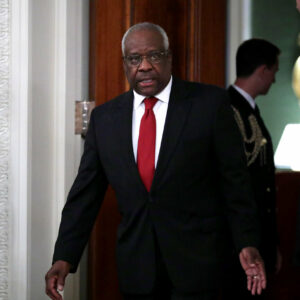
Justice Clarence Thomas has distinguished himself as a rigorous jurist on the Supreme Court. He is also distinguished as a long-serving member—with 30 years on the bench, he is the 16th longest-serving justice of the 115 men and women who have served on the court. Should he continue to serve through May 20, 2028, he will become the longest-serving justice in history, surpassing Justice William O. Douglas.
Describing, let alone evaluating, a 30-year judicial record is challenging on its own, but Thomas’ record of judicial service is continuing. A few aspects of his Supreme Court tenure stand out.
Thomas wrote a concurring opinion in Gamble v. United States in which he described the “modest” judicial task this way: “We interpret and apply written law to the facts of particular cases.” Sounds simple enough. Since America’s Founders designed our system of government, however, the tough issue has been how judges should perform this modest task.
Thomas has always been clear about the right answer. When Thomas’ confirmation hearing before the Senate Judiciary Committee opened on Sept. 10, 1991, Sen. Orrin Hatch, R-Utah, said, “I am confident that Judge Thomas will interpret the law according to its original meaning, rather than substitute his own policy preferences for the law.”
Those are, in fact, the two basic interpretive choices: figuring out what the law’s author meant by what the author wrote, or imposing a meaning upon the law of the judge’s choosing. Thomas embraces the former, and rejects the latter. . . .
[W]hen it comes to the court’s most important work on a case, the written opinion explaining its decision, Thomas works harder than anyone.
According to data compiled by SCOTUSblog.com, for example, Thomas has written the most total opinions (majority, concurring, and dissenting) in eight of the last 10 terms, more than 700 total opinions since he joined the Supreme Court.
The Harvard Law Review also compiles and publishes statistics from each Supreme Court term, including the total number of pages for each justice’s opinion. Thomas ranked first, second, or third in a majority of terms for which data were available.
In oral arguments, justices’ questions may (or may not) reflect their actual thoughts or even be related at all to the case at hand. A justice’s written opinion, however, whether for himself alone or for a unanimous court, is the real deal.
Unlike most new justices, Thomas wrote a lone dissent in a case argued less than three weeks after he took office. In Dawson v. Delaware, the Supreme Court voted 8-1 that a convicted murderer’s membership in the Aryan Brotherhood was an irrelevant factor that should not have been considered in deciding whether to impose the death penalty. Thomas disagreed, arguing that “[j]urors do not leave their knowledge of the world behind when they enter a courtroom and they do not need to have the obvious spelled out in painstaking detail.” . . .
For him, the judicial task does not change that his job is to interpret the Constitution or statutes (discern what the author meant by what the author wrote) and apply them impartially to the facts of each case. But as he wrote about jurors in Dawson v. Delaware, judges do not leave their knowledge of the world behind when they enter a courtroom. The key is for judges to remember the difference between their knowledge of the world and the law.
Others have noted this important distinction. Judge Robert Smith, who served on New York state’s highest court for a decade, published an essay titled “Why I Admire Justice Thomas” in 2009. He came to this conclusion the old-fashioned way, by reading Thomas’ opinions. He quoted President Barack Obama’s remarks when nominating Justice Sonia Sotomayor that a Supreme Court justice should understand that “justice isn’t about some abstract legal theory or footnote in a case book” but “also about how our laws affect the daily realities of people’s lives.” . . .
Before joining the Supreme Court, Thomas served for 19 months on the U.S. Court of Appeals for the D.C. Circuit. Shortly after joining that court, he and I talked about how he viewed his judicial role as different from his previous position as head of an executive branch agency. Every day when I put on that robe, Thomas said, “I have to remind myself that I am only a judge.”
(Excerpt from Daily Signal. Article by Tom Jipping.) Reprinted with permission. ifapray.org
No Comments
Leave a comment Cancel